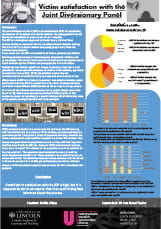by Hollie Skipp //
 The Joint Diversionary Panel uses a Muti-agency approach to Youth Justice, which utilises information from a myriad of services to inform holistic decision making. The JDP are in place to decide whether a young person is criminalised or given an out of court disposal. The aim of JDP is to divert children and young people away from the Criminal Justice System. Lincolnshire County Council introduced the JDP in 2017 and have commissioned an independent evaluation to assess the impact of diversionary interventions. It was noted that the Joint Diversionary Panel in Lincolnshire had been primarily established following detailed analysis of criminal justice disposals for children and young people. The analysis had highlighted an inconsistent use of Police cautions against children and young people. It was therefore highlighted that without significant change in practice, there was a clear potential for increased criminalisation of children in Lincolnshire, especially Looked After Children (LCC, 2017).The research project for UROS endorses a student as producer ethos, therefore it aims to emphasise the role of students as collaborators in the production of knowledge. Therefore, in order to adopt a student as producer outlook, I have been proactive in my research to find interesting conclusions about victim satisfaction with the JDP. There is a gap in the research, as the JDP differs in each county and it was introduced in 2017, thus since then there has been limited independent evaluations.
The Joint Diversionary Panel uses a Muti-agency approach to Youth Justice, which utilises information from a myriad of services to inform holistic decision making. The JDP are in place to decide whether a young person is criminalised or given an out of court disposal. The aim of JDP is to divert children and young people away from the Criminal Justice System. Lincolnshire County Council introduced the JDP in 2017 and have commissioned an independent evaluation to assess the impact of diversionary interventions. It was noted that the Joint Diversionary Panel in Lincolnshire had been primarily established following detailed analysis of criminal justice disposals for children and young people. The analysis had highlighted an inconsistent use of Police cautions against children and young people. It was therefore highlighted that without significant change in practice, there was a clear potential for increased criminalisation of children in Lincolnshire, especially Looked After Children (LCC, 2017).The research project for UROS endorses a student as producer ethos, therefore it aims to emphasise the role of students as collaborators in the production of knowledge. Therefore, in order to adopt a student as producer outlook, I have been proactive in my research to find interesting conclusions about victim satisfaction with the JDP. There is a gap in the research, as the JDP differs in each county and it was introduced in 2017, thus since then there has been limited independent evaluations.
The advantage of working with my supervisor, was that she has a vast knowledge of the University ethics procedures. Whilst, I have a knowledge of the themes which emerge from the British Psychological Societies ethical guidelines and the Economic and Social Research Council. The themes which are transferable include: right to withdraw, debrief, protection from psychological harm, informed consent, etc.
I feel prepared for the future because this research project has given me an array of general and research specific transferable skills. General skills include: following processes such as GDPR; leadership such as ability to take control of an interview and communication such as liaising with my supervisor and the youth offending service staff. Specific skills include: interview technique, survey writing technique, analysis using Excel and N-Vivo. These are the type of skills applicable to many career pathways, but specifically for me to get on to an internship programme with Lincolnshire Police after university, then it equips me with the tools to compete against other graduates for this role.
*To view Hollie’s project poster, please click on the thumbnail below:
